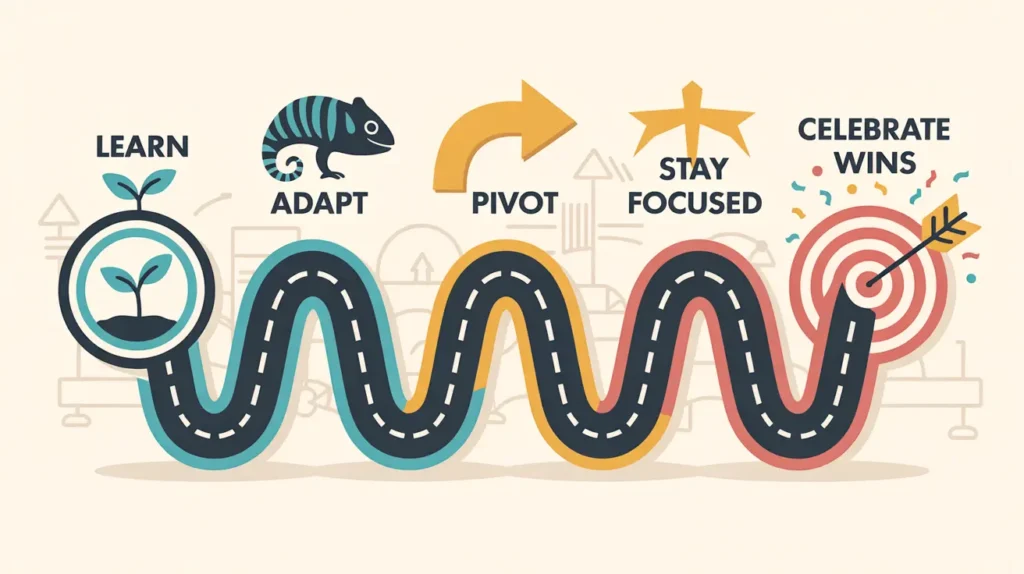We all love hearing about success, the big wins, the amazing results, the happy endings. But what we don’t always talk about is the hard part that usually comes first: failure. The truth is, most success stories are built on a series of failures that helped shape the person behind them.
Failing doesn’t mean you’re not good enough. It just means you’re learning. Every time something doesn’t work out, you get a little smarter, a little tougher, and a lot more prepared for the next try. In fact, some of the most successful people in the world failed more than once before they got it right.
In this article, we’ll explore how failure can actually move you forward. You’ll see how it teaches important lessons, builds resilience, and opens the door to new opportunities. So if you’ve hit a bump in the road, don’t panic. That “failure” might just be the thing that sets you up for your biggest win yet.
Key Takeaways
- Failure is not the opposite of success; it’s part of the journey toward it.
- Every setback carries a lesson that helps you grow smarter and stronger.
- Resilience and persistence matter more than avoiding mistakes.
- Many great successes, from inventions to businesses, were born out of failure.
- Shifting your mindset from “failure = defeat” to “failure = feedback” makes all the difference.
- Flexibility and adaptability turn obstacles into opportunities.
- True success comes from learning, adjusting, and moving forward, not from getting it right the first time.
The Role of Failure in Success
Failure might feel disappointing in the moment, but it’s actually one of the best things that can happen on your way to success. It teaches you lessons, builds your inner strength, and sometimes even leads to amazing new ideas. Let’s look at how failure actually helps you move forward.
Failure Teaches You Important Lessons
When things don’t go as planned, you get a chance to learn what not to do next time. Every mistake shows you something valuable if you’re open to learning from it.
Think about Thomas Edison. He failed thousands of times before finally inventing the light bulb. But he didn’t give up. He saw every failed attempt as one step closer to success.
And then there’s J.K. Rowling, the author of Harry Potter. Her book was rejected by many publishers before one finally said yes. Today, she’s one of the most famous authors in the world.
Failure Makes You Stronger
When you fall down and get back up again, you build resilience. You become tougher, more focused, and more determined to reach your goal.
Take Oprah Winfrey, for example. She was told early in her career that she wasn’t right for TV and she even got fired! But instead of quitting, she kept going. That drive helped her become one of the most successful and inspiring people in the media.
Failure Can Lead to Great Ideas
Sometimes, what seems like a mistake can actually turn into something brilliant.
For instance, Post-it Notes were created by accident. The glue was supposed to be super strong, but it turned out weak and reusable. Instead of throwing the idea away, the team at 3M saw its value and turned it into one of their most popular products.
The Mindset Shift: From Fear to Growth

Success isn’t just about talent or luck; it’s deeply connected to the way we think. If you believe failure is the end, it will hold you back. But if you see it as a stepping stone, you’ll move forward faster and stronger. Let’s break down how shifting your mindset can turn fear into growth.
Fixed vs. Growth Mindset (Based on Carol Dweck’s Theory)
Psychologist Carol Dweck talks about two types of mindsets: fixed and growth.
- People with a fixed mindset believe their abilities are set in stone. They avoid challenges because they fear failure will make them look “not smart enough.”
- People with a growth mindset believe they can improve with effort. They see failure as part of the learning process.
Think of it like this: if you’re learning to ride a bike, a fixed mindset would make you quit after a fall. But a growth mindset says, “Okay, that hurt… but I’ll get better with practice.”
Reframing Failure: It’s Feedback, Not Defeat
Changing how you see failure can make all the difference. Instead of seeing it as something negative, treat it like feedback. It’s just information telling you what to adjust next time.
Look at Elon Musk and his company SpaceX. His rockets exploded multiple times in the early days. Each failure was a learning opportunity. Instead of giving up, Musk and his team kept testing, improving, and trying again. Now SpaceX is a leader in space technology!
The Power of Persistence
Even the most successful people didn’t get it right the first time. What sets them apart is that they didn’t stop trying.
That’s where persistence comes in, showing up even when things get hard. It’s about pushing through the doubts and continuing with hope.
As Winston Churchill famously said:
“Success is stumbling from failure to failure with no loss of enthusiasm.”
This quote reminds us: You don’t have to be perfect. You just have to keep going.
Strategies to Turn Failure into Success

Failure can feel awful but it’s not the end of your story. In fact, many people who succeed big have failed first (sometimes a lot!). The trick is knowing what to do next. Here are a few simple strategies that really work:
Learn from Your Mistakes
Every failure has a lesson in it. Instead of ignoring what went wrong, try to understand it.
Ask yourself:
- Why didn’t this work out?
- What can I do differently next time?
Think of failure as feedback. It’s not saying “you’re not good enough,” it’s saying “this way didn’t work, let’s try another.”
Be Ready to Change Direction
Sometimes, your first idea or plan just isn’t the right fit and that’s okay! What matters is your ability to pivot and try something new.
For example, did you know Airbnb started by selling cereal? That didn’t go far but it kept them afloat until they figured out their real idea: helping people rent out their homes to travelers. That little shift changed everything!
So if one path doesn’t work, be flexible. Another one might work even better.
Stay Focused on the Big Picture
Success usually takes longer than we expect. That’s why it’s important to stay patient and keep going.
Look at Colonel Sanders, the founder of KFC. He got rejected over 1,000 times before someone believed in his chicken recipe. And he started at age 65! His story proves that if you believe in your goal and stick with it, amazing things can happen, no matter how
Conclusion: Failure Isn’t the End, It’s a Step Forward
Failure might feel like a dead end, but it’s really just part of the journey. Every mistake teaches you something, and every setback helps you grow. Big names like Steve Jobs, Oprah, and Walt Disney all faced failure and came back stronger.
What matters most is how you respond. Don’t let failure stop you. Learn from it, make changes, and keep moving. You’re not starting over, you’re starting smarter.
FAQs
Why is failure important for success?
Failure is important because it teaches lessons that success can’t. Every mistake shows you what doesn’t work, builds resilience, and pushes you to improve. Without failure, growth and true innovation would be impossible.
How can I stay motivated after repeated failures?
Motivation comes from focusing on the bigger picture instead of short-term setbacks. Remember why you started, celebrate small wins, and look at each failure as progress. Persistence, not perfection, leads to lasting success.
Can failure ever be a good thing?
Yes, many breakthroughs come directly from failure. Mistakes often spark new ideas, improvements, or even entirely new paths. What looks like a setback today could become your greatest advantage tomorrow.
How do successful people handle failure differently?
Successful people don’t see failure as final. They treat it as feedback, make adjustments, and try again. Their resilience and willingness to learn set them apart from those who quit too soon.
What’s the best way to turn failure into success?
The best way is to reflect on what went wrong, adjust your approach, and keep moving forward. Flexibility, persistence, and a growth mindset transform setbacks into stepping stones toward achievement.





